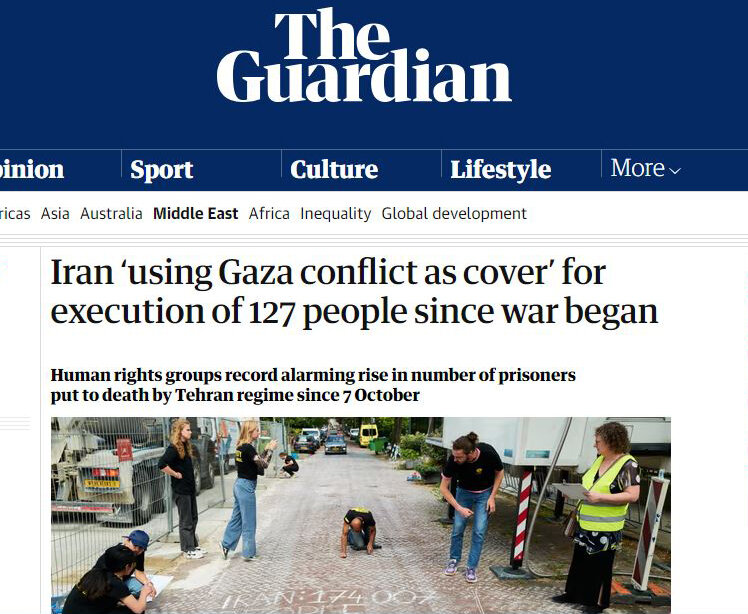Human rights, a tool to cover up Israel's crimes in Gaza

TEHRAN - Some Western think tanks, providing invalid information about the issue of human rights in Iran, make bids to deflect public opinion from the realities in the Gaza Strip.
On December 2, the Guardian published a report, penned by Deepa Parent, accusing the Islamic Republic of failure to observe human rights.
Deppa, simultaneous with her report, tweeted, “The Islamic Republic has been executing prisoners at an alarming rate.”
Deppa, by neglecting Iran’s endeavor to uphold human rights, has based her report on unauthentic and unspecified sources and spared no effort to call Tehran’s actions in the realm of human rights into question.
Deepa’s report, void of authentic data, only pleases the Zionist lobby which, by controlling the media outlets and the narratives of the Gaza Strip, tends to downgrade the scope of the massacre taking place in the occupied territories.
It should be noted that journalists, with their unbiased stances, bear the responsibility to inform people. But, unfortunately, biased journalism has been alarmingly widespread, especially since the beginning of the Gaza war.
Rami G Khouri, a distinguished fellow at the American University of Beirut and a journalist, also criticized the “poor, biased, and shallow journalism” on November 28.
Pointing to the media coverage over the one-week truce between Hamas and the Israeli Army, Khouri said, “In fact, what I saw was less journalism aimed at informing audiences on current affairs across the world, and more reality television carefully designed and performed to entertain them.”
Western media in no position to advise Tehran on human rights
Western media outlets have lost their credibility with their silence over the Israeli war crimes since the beginning of the Hamas operation on October 7.
These media took a step further and released biased information about the realities in the coastal enclave.
In addition to the Gaza news boycott and the all-out support for the occupying regime, Western media outlets are said to be acting as puppets in the hands of Zionists.
Tel Aviv leaders have fully supervised these media.
On November 1, Rami G Khouri shed light on Israel’s scrambles to dominate the Western media narrative. He said that for years, right-wing pro-Israeli groups like CAMERA and the Canary Mission have tried to silence academics, activists, and journalists who offer Palestinian perspectives so that Israeli views prevail.
According to Khouri, a sinister new tactic tries to silence journalists not because of their reporting, but over social media opinions they posted, sometimes years ago.
Against the backdrop of controlling the narrative on Gaza, Omar Suleiman, an American Muslim scholar and activist for human rights, said on November 30, “It (the Israeli regime) does not hesitate to brand as “terrorists” and assassinate Palestinian journalists who work tirelessly to tell Gaza’s truth to the world.”
He reiterated, “Israel does not allow foreign journalists to enter Gaza and report on what they see freely either,” quoting CNN’s Fareed Zakaria who recently admitted that the Israeli military currently only allows into the Gaza Strip foreign journalists who agree to submit all materials and footage to the Israeli military for review before publication.
These media outlets, which failed to adhere to the basics of journalism, have avoided shedding light on Israeli war crimes in the occupied territories. In the meantime, through the allocation of false accusations to other countries, they have tried to deflect public opinion from the ongoing realities in the Gaza Strip.
In a nutshell, are these biased media outlets and journalists in a position to express worries over human rights in Iran?
Iran's judicial process is fair
Islamic Republic’s legal code is based on Islamic law or sharia, and many aspects of civil law have also been retained.
Iran has been carrying out its judicial rulings per the law.
According to the constitution of the Islamic Republic, the judiciary in Iran is independent.
The court structure includes Revolutionary Courts, Public Courts, Courts of Peace, and Supreme Courts of Cassation.
Given the brief introduction to Iran’s legal system, the claim of Deppa about “forced confession” is also refuted since all the victims in Iran’s courts are subject to a fair legal process.
Leave a Comment